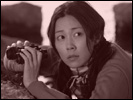Fine, Totally Fine
- Year
- 2008
- Original title
- Zenzen Daijobu
- Japanese title
- 全然大丈夫
- Director
- Cast
- Running time
- 110 minutes
- Published
- 17 May 2008



by Jasper Sharp
It's always a bit of a cop-out to describe a film as "undescribable." What I will say, however, is that nothing I had read about Fine, Totally Fine before watching it had primed me for what turned out to be one of the funniest, most charming, and genuinely unique films I've seen in a long, long time. The surprise was all the more pleasant because a simple description of its plot hardly seems to promise great things, revolving around a young man driven by an ambition to build the world's scariest haunted house. In execution, however, this commercial debut from Yosuke Fujita, a director better known for his work on the stage, is nothing short of an inspiration.
Much of Fine, Totally Fine's charm can be laid at the feet of actor Yoshiyoshi Arakawa. You might not know the name, but the face should certainly be familiar if you've seen such recent films as Ping Pong (2002), Kamikaze Girls (2004) and Survive Style 5+ (2004). Arakawa's genial yet more than slightly gormless screen persona perhaps finds its best parallel with the pudgy English actor James Corden, who followed up his screen debut as Tonka in Shane Meadows' Twenty Four Seven (1997) with memorable roles in Mike Leigh's All or Nothing (2002) and Nicholas Hytner's The History Boys (2006) while maintaining a strong presence on television, first in the series Boyz Unlimited (1999) and the teen soap Hollyoaks, and now best known for the comedy Gavin & Stacy (which he also co-writes and co-produces). Arakawa too is more familiar in Japan through his small screen work, with his film appearances mainly restrained to supporting roles as simple comic foils. Fine, Totally Fine is the first time he's had to carry the lion's share of the weight of a picture on his shoulders, and the film consequently takes many of its best attributes from his guileless performance.
Arakawa's character is Teruo, a part-time manual labourer and full-time dreamer who lives with his father in a flat above the family-run used bookshop - the setting for many a fine comic moment between the various weirdos in Teruo's orbit. Teruo's strange ambition to build a haunted theme park seems primarily motivated by a childish desire to ignore the fact that it might well be time to grow up and face the real world, but nevertheless, his friends and family initially seem to go along with his puppish enthusiasm, even as they find themselves continually subjected to a succession of elaborate spooky pranks as he refines his art of scare-making. When it comes to the actual practicalities of turning this fantasy into a viable business however, it's pretty clear that a ghost house might not be the passport to fame and fortune that Teruo seems to imagine it to be.
Not that any of Teruo's friends have any tighter grip on reality. One entertains dreams of becoming a major film director, involving his peers in his inept camcorder horror productions. The only one who looks like he has his feet on the ground is Hisanobu (Okada), a sensitive young man born on the same day as Teruo and with a responsible job as a hospital manager. Hisanobu is so kind-hearted, sensitive and eager to please that his female colleagues can't believe he's still single, and band together to find him a wife. After a mishap at work however, Hisanobu too finds himself plunged into a life crisis when his boss tells him that his politeness is really nothing more than a façade masking a fundamentally selfish urge to be liked by everyone.
The third player in this drama seems an unlikely candidate to force the others into a reality check. We first encounter Akari (Kimura), an accident-prone she-nerd with a voracious appetite for chikuwa fish sausages, spying through binoculars at a demented bag lady (not too dissimilar to how Miki Nakatani's character winds up at the end of Memories of Matsuko) as she festoons her makeshift riverside barrack with colourful dolls and decorations fashioned from the flotsam and jetsam gleaned from the surrounding rubbish-strewn environment. A jittery, social misfit who can only express her feelings through art, Akari clearly identifies with the older woman, whom she commits to paint in the privacy of her own apartment in a series of brilliantly-coloured canvasses.
For a good part of the first half, it is not entirely clear how or when Akari's path will cross with that of Teruo, yet alone what the results of such a meeting might be. The plot unfolds as a collage of visual and quirky comic turns that are so deftly delivered and effective you'll be laughing so hard you never stop for one moment to question where the film is headed. And yet beneath the slapstick there's a genuine sense of warmth and affection for the eccentric characters that populate this oddball world. Like a modern-day Chaplin or Keaton, director Fujita draws us into their frustrated feelings and desires through scenes of extreme pathos, such as those involving Teruo's heartsick father or Teruo, Hisanobu and Akari's embarrassed attempts at opening their hearts to one another, then immediately knocks us off-guard with some ridiculous belly laughs - and more often than not, as soon as the audience has recovered, immediately trumps it up with an even funnier reaction shot.
Fujita's comic timing is impeccable. There's not one moment when he doesn't have the audience completely eating out of his hand, but ultimately when the joking is all over, what has started out in the pure slapstick vein lingers in the mind as something rather sweet and affecting, something all the more amazing when you consider this is his first mainstream picture. Actually, this statement needs some qualification. This is not exactly Fujita's first film. He made his directing debut in 1986 with the 8mm A Terrible Tiger, and already in 1990 had picked up the Image Forum Special Jury Prize for a work entitled Kuragetsuri (Jellyfish Fishing). However, instead of pursuing a filmmaking career, Fujita opted for the live stage, producing both plays and their opening visuals, and collaborating with an acting/comedy troupe known as the Otona Keikaku Theatre Group, founded by Suzuki Matsuo. One of the other collaborators from this time was none other than Kankuro Kudo, the screenwriting wunderkind who in recent years has taken the industry by storm with his scripts for films such as Go!, Ping Pong, Sixty Nine and Maiko Haaaan!!!, and directed Yaji and Kita: The Midnight Pilgrims (2005) from his own script. In 1999, Fujita directed Kudo and his two bandmates Sadao Abe and Seminosuke Murasugi in Group Tamashii: Electric Viper (Group Tamashii Denki Mamushi), a video for their three-piece comedy punk band. It's been a fair time in coming then, Fujita's commercial feature debut, but clearly his unorthodox two-decade apprenticeship before settling into the director's chair properly has been time well-spent indeed, and in good company too. One can only hope it's not too long before he follows up Fine, Totally Fine, because this wonderful film certainly suggests that he has the inventiveness and control to follow in the industry where Kudo has led.
Fine, Totally Fine received the audience prize at Nippon Connection in Frankfurt, and deservedly so too, though it was up against some pretty stiff competition. I've said it before, and I'll say it again, Nippon Connection is THE premier event anywhere in the world to get a good idea of what is going on within Japan's vibrant film culture in any one year, and on the basis of the selection this time round, it seems there's a big sea change afoot in Japanese cinema at the moment - although whether this will be reflected by the titles distributors choose to release overseas is another matter entirely. Clearly one of the most evident trends over the past few years has been a move away from the pessimism and navel-gazing of the more auteur-driven works that proliferated across festivals worldwide at the turn of the millennium, and away from the violence, perversion, and gore that many mistakenly identify with Japanese film.
A large proportion of the films screened in Frankfurt the same year were by first-time directors, and the emphasis overall seemed to be set far more squarely on providing solid entertainment and good clean fun. Criticisms of Japanese films as being self-indulgent, poorly structured and overlong hardly seemed appropriate for titles such as Hideyuki Hirayama's Three for the Road, Daihachi Yoshida's Funuke Show Some Love You Losers!, and Dog in a Sidecar, the latest by the criminally underrated Kichitaro Negishi. On the other side of the coin, there's been much talk over the past few years of a general retreat away from political subject matter in Japanese cinema. The tide certainly seems to have turned if this year's program was anything to go by, with a notorious talking point provided by the documentary Yasukuni, directed by the Tokyo-based Chinese director Li Yang and, if you haven't been following, already the subject of huge public and parliamentary debate in Japan, having been pulled from most cinemas following threats from rightwing groups. There was also the US-Japan collaboration Tokko: The Wings of Defeat (Risa Morimoto / Linda Hoaglund) about Kamikaze pilots, and Koji Wakamatsu's 3-hour+ epic United Red Army, which can easily lay claim as the crowning moment of an already astonishing 45-year filmmaking career. And if all this wasn't already enough, there were several sublime first works from the indie sector made by directors still in their early 20s, including Hiroki Iwabuchi's A Permanent Part-Timer in Distress, Ryo Nakajima's This World of Ours and Yasutomo Chikuma's Now, I.... In the meantime, all I can say is if you get any chance to see Fine, Totally Fine, just make sure you don't pass up on it, and best be sure to get yourselves down to Frankfurt at the next possible occasion.